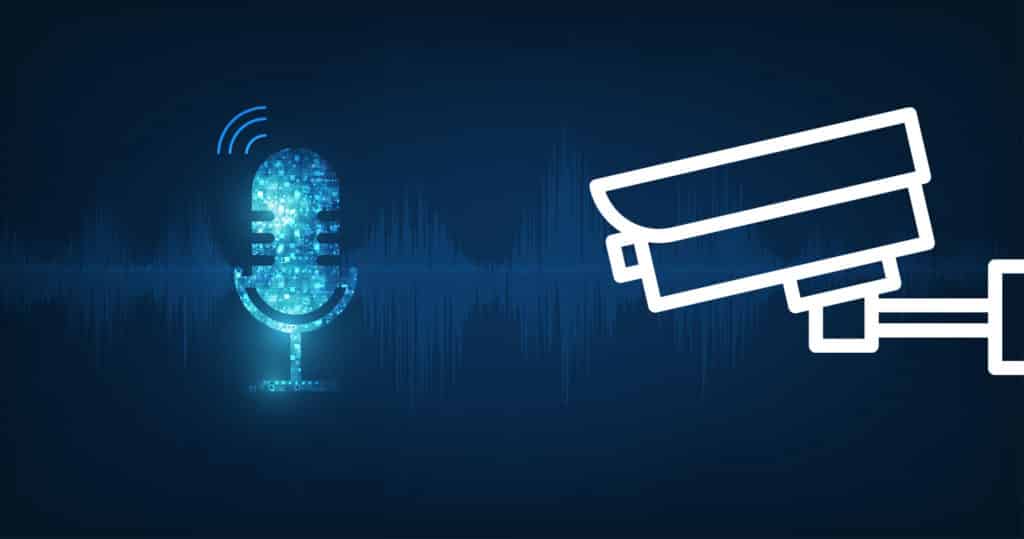Do surveillance cameras have sound? Can security cameras record audio? Let’s dive into this topic.
These days, it’s rare for a business to lack a security system. Employers install video surveillance to curb criminal activity, whether it’s internal (like equipment theft) or from unexpected external threats.
Modern security cameras have come a long way from the old analog CCTV cameras. There’s quite a menu of features to choose from, including selecting a system with audio recording. That’s right: While historically, older CCTV cameras could only capture video, modern security cameras can also capture audio from what’s happening on your property. In fact, advanced surveillance systems today can not only record sound, they can play it, too – giving notifications and warnings to trespassers that they are being recorded and should leave immediately.
What are the benefits and rules governing audio surveillance cameras? Here’s what you need to know.
Do Security Cameras Have Audio?
Yes, you can purchase a security system with audio recording capabilities in addition to video recording ones. However, most older CCTV cameras you see are not “CCTV cameras with audio” as you think of them; that is, they do not have an audio feature built into the camera itself, which would be the case with more modern cameras.
Older security cameras that include audio recording features usually have an add-on microphone to capture sound. By comparison, more advanced audio surveillance cameras have sound capabilities built right in. Some of modern security cameras have one-way audio, and some surveillance cameras have two-way audio.
Basically, these built-in microphones are designed to capture audio while recording video footage to provide useful information that were not captured on video. Alternatively, they can be used to trigger video recording when a specific motion event is detected.
There are also security cameras that have two-way audio systems that let you use the camera to communicate with someone on the other end. Imagine being able to confront a stranger encroaching on your property after hours. That gives you an idea of the power of today’s innovative audio camera features.
The type of audio surveillance camera you use will determine how the audio and video images are captured and stored.
-
IP audio surveillance cameras feed their video and sound through the camera and into the cloud. The signal transmission digitizes the data and sends it wirelessly to a remote server. You can access that data through any digital device, whether it’s a cellphone, laptop, tablet, or desktop.
-
Analog audio surveillance cameras s send the information they capture to an onsite DVR. The signal remains analog, and you must view the data directly from the DVR.
Rather than looking for a security camera that has audio capabilities, most modern video surveillance cameras have an optional external microphone input jack. You can add a mic to the camera as an add-on feature. What are the benefits and risks of incorporating audio into your video surveillance tools?
What Are the Benefits of a Security Camera with Audio Recording?
We’ve discussed what it means to be a security camera that has audio, but do they actually matter? In other words, if you’re going to invest money in a surveillance camera that can record sound or a microphone system that can turn an older CCTV camera into a CCTV camera with audio… should you? What are the upsides?
Using one-way or two-way audio as part of your security system offers incredible business benefits. One-way security cameras with audio recording can capture important vocal data on tape to increase your surveillance capabilities and provide additional context to video footage. Integrating recordable audio capabilities gives you more details about activities happening in your business. It can also extend the reach of your security teams and allow them to respond more effectively to incidents.
Today’s cameras are getting smarter. Imagine a camera that can flag not only visuals but sounds to alert you to a problem. For instance, a clever trespasser could, conceivably, learn where your cameras are placed and try to find blind spots, but they can’t hide the sounds that they make on your property. That’s just one of the benefits of a security camera system with audio recording.
See How Simple It Can Be To Secure Your Business.
Audio detection adds an added layer of protection to CCTV systems by allowing cameras to detect sounds and disturbances within their range, detecting possible vandals and invaders even before they come into view. By capturing audio cues such as footsteps or breaking glass, security cameras with audio detection features can trigger immediate alerts and provide your security team enough time to respond and avoid potential threats.
Think of it this way. Your video surveillance system, like us, can use its brain, eyes, ears, and other senses to detect threats. Powerful video analytics on today’s modern IP cameras can detect and identify sounds even when a camera points in a different direction.
Modern sound detection software can detect and alert to a high decibel level (screaming, breaking glass, a gunshot). Alternatively, they can alert to a specific audio pattern. Unlike a constant audio stream, you could enable audio analytics that works in buffer mode to alert and record the specific incident. This makes for powerful forensic evidence, should you need it later on.
Two-way audio has also evolved over the years to make cameras more effective. Today, you can deploy audio and visual deterrents to proactively warn off intruders in addition to recording sound.
Audio and visual deterrents are 97% effective at scaring off intruders. You can use these two-way audio features to sound alarms or have a dialogue with an intruder, informing them the police will shortly be dispatched if they don’t leave immediately. These capabilities are part of smart camera features that allow you to pan and zoom the lens.
Are There Any Other Reasons Why Your Business Needs Surveillance Cameras with Audio?
Does your business use security cameras with audio capabilities? If not, it may be high time to consider upgrading your surveillance system.
Aside from providing improved surveillance capabilities and overall security, using surveillance cameras with audio integration can benefit your business in several ways.
For example, you can use them in high traffic areas to monitor people movement and ensure their safety. This comes especially useful during high traffic periods and in times of emergency.
Audio-enabled security systems can also be an effective tool in employee training and monitoring. With such systems in place, you can observe not only how your staff interact with customers, but with clients and coworkers as well, thereby helping ensure policy compliance and quality control.
These modern surveillance systems also help provide better customer experience, allow for a more efficient conduct of the day-to-day operations, aid in making better business decisions, and curb theft and vandalism among your employees.
Additionally, security cameras with audio recording capabilities can also provide ample protection against liability and help you avoid expensive and time-consuming lawsuits which can be damaging to your business.
Despite the numerous benefits, there are some potential legal ramifications for recording with a security camera system with audio recording features. What are the risks of using these tools?
What Are the Risks of Using Surveillance Cameras That Have Audio?
Do you currently use surveillance cameras that have audio? Generally, recording audio surveillance footage is illegal. Federal wiretap laws normally prohibit recording sound from surveillance unless both parties know they’re being recorded.
While most states allow audio and video capture, there are a few exceptions for obvious reasons in places where a person may be getting undressed, such as a locker room. Keep in mind, video and audio surveillance laws vary by state. Businesses must follow the laws of their state before using these devices. This is an excellent breakdown on laws for recording conversations in all 50 states.
Many employers use video recordings of their employees to ensure safety and prevent theft. This seems to be acceptable under most state laws as long as the employees know they’re being recorded. In general, you can solve this by putting up a visible signage stating that audio monitoring is taking place in the premises. Thus, anyone entering or accessing the location knows that there is no guarantee of privacy and is consenting to being monitored.
However, each state makes its own rules, which adds to the complexity of the issue.
For example, Delaware and Connecticut laws say that businesses have to notify customers and their employees if there is video surveillance “that may break any expectations of privacy, such as in a bathroom or changing room.” While these rules seem to lean more heavily toward the video portion of security surveillance, what about audio? This also varies by state.
Another example is Ohio. The Ohio Revised Code says it’s a crime to record any “wire, oral, or electronic communication.” However, it does not say you cannot use an audio surveillance camera to monitor and respond to criminal activity—just to record it.
In the state of Florida, concealed video and audio recording of individuals in places where there is a reasonable expectation of privacy (e.g., bathroom, dressing room, etc.) is punishable by law. However, Individuals in public spaces, such as the beach or in a parking lot, are not protected by the law.
Generally, the majority of US states allow audio recording as long as one party involved expresses permission. The only exception are the twelve two-party consent states (California, Connecticut, Delaware, Florida, Illinois, Maryland, Massachusetts, Montana, Nevada, New Hampshire, Pennsylvania, and Washington) where recording audio without the consent of everyone involved is considered illegal.
It should be noted that these video and audio surveillance laws are subject to change, thus it is critical to review the appropriate laws at the local, state, and federal levels before installing audio and video surveillance systems.
Audio Surveillance Cameras: Does the Benefit Outweigh the Risk?
Augmenting your video capture capabilities with an audio component offers both benefits and risks. Audio surveillance cameras can add to the information you capture for better decision-making. But it also brings some legal risks that you might need to consider.
Using audio recording in surveillance may create privacy concerns. While video monitoring is widely acknowledged as an essential security measure, audio recording is considered a more intrusive form of surveillance since it can be used to record private chats, sensitive information, and personal details without the users’ knowledge or consent.
To avoid such issues, you need to carefully review the specifications of a surveillance camera before purchasing to ensure that it meets the desired audio recording needs and complies with legal requirements.
How you proceed from here requires expert guidance from the team at Pro-Vigil. We work with businesses to provide the best security surveillance capabilities technology and their budget will allow.
Talk with our team today about whether enabling security cameras with audio recording features is right for your business.
FAQ
Modern security cameras can in fact have audio recording capabilities built into the camera itself. Older CCTV cameras usually did not have audio; if they did, it was part of a larger system that used a separate microphone to record audio while the camera itself recorded video.
It’s true that there are many benefits from surveillance cameras that can record audio, like being able to detect intruders who may not be in the camera’s field of view. However, recording audio can be in a tricky space legally speaking depending on your state. You should discuss using security cameras with audio recording with your security company to determine your options and what is right for you.











